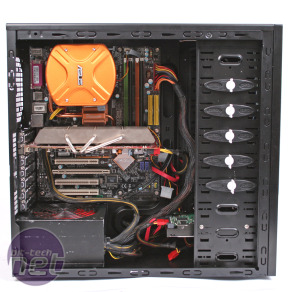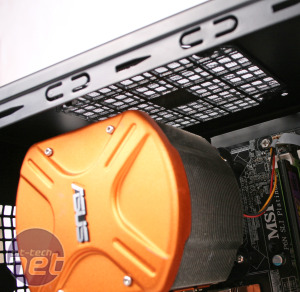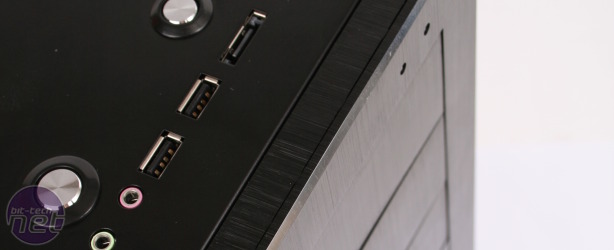
Performance Analysis
The Rebel9 performed broadly in line with our predictions given its default cooling configuration. When idle we saw a high CPU delta T of 15oC, which puts the case firmly at the bottom of the pile of cases we’ve tested over the past couple of years. The GPU idle delta T of 23oC wasn’t the worst result we’ve seen, but was hardly the coolest either.The Rebel9 was also pretty toasty during the CPU load test, allowing the CPU to get to a delta T of 32oC – this is one of the worst results we’ve seen. The case fared slightly better in the GPU load test, as it jumped just ahead of the Fractal Design Define R2 with a poor GPU delta T of 57oC. However, the Define R2 is designed to be quiet, with chunky solid side panels – the Rebel9 and its large side panel and roof fan mounts will do nothing to prevent a noisy graphics card or CPU cooler annoying you.
These open fan mounts did help the Rebel9 to cool out hardware though – we could feel the CPU cooler sucking cool air in through the roof and side panel mounts. This made us wonder what value the front fan was adding, and also that if the Rebel9 hadn’t had these large holes, it would likely have cooled even worse than it did. At least that front fan was quiet, even if the case itself tended to rattle as we touched it or knocked our desk.
Conclusion
In our experience, if you’re going to have only one fan in a case, it needs to be positioned as an exhaust. This gets rid of hot air from the case, and pulls cool air into the case through the negative internal pressure it creates.The Sharkoon Rebel9 Aluminum goes against this and suffers because of it. In its out of the box configuration, it’s one of the poorest cases for cooling we’ve reviewed, and only the abundance of mesh and vents at the back of the case prevented it from some truly woeful temperatures. Adding more fans could fix this problem, but adding fans to a budget case is a false economy - by the time you’ve spent £30 on adding fans to the case you may as well have just bought a more premium case in the first place.
The Antec Three Hundred is a much cheaper case than the Rebel9, and while it might not have quite such a clean look, it offers much better cooling out of the box and more space inside. Then again, the Xigmatek Utgard now costs just £6 more and offers better cooling and build quality, as well as a two-channel fan controller. While the aluminium fascia attempts to add a touch of quality to the Rebel9, this is lacking elsewhere, meaning that there are much better alternatives for your next case.
- Features
- x
- x
- x
- x
- x
- x
- -
- -
- -
- -
- 6/10
- Build Quality
- x
- x
- x
- x
- x
- x
- -
- -
- -
- -
- 6/10
- Ease of Use
- x
- x
- x
- x
- x
- x
- x
- -
- -
- -
- 7/10
- Performance
- x
- x
- x
- x
- -
- -
- -
- -
- -
- -
- 4/10
- Value
- x
- x
- x
- x
- x
- -
- -
- -
- -
- -
- 5/10
- Overall
- x
- x
- x
- x
- x
- -
- -
- -
- -
- -
- 5/10

MSI MPG Velox 100R Chassis Review
October 14 2021 | 15:04











Want to comment? Please log in.